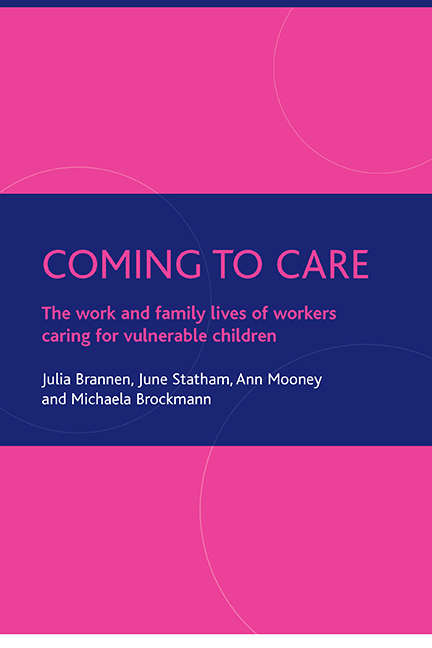Book contents
- Frontmatter
- Contents
- List of tables and boxes
- Acknowledgements
- one Setting the scene
- two The study
- three The origins of a care ethic in care workers’ childhoods
- four Entering care work with vulnerable children
- five Care workers’ careers and identities: change and continuity
- six What do vulnerable children need? Understandings of care
- seven Experiences of care work
- eight Leavers, movers and stayers
- nine Managing care work and family life
- ten Conclusions and policy implications
- Appendix: Boxes and additional tables
- References
- Index
six - What do vulnerable children need? Understandings of care
Published online by Cambridge University Press: 15 September 2022
- Frontmatter
- Contents
- List of tables and boxes
- Acknowledgements
- one Setting the scene
- two The study
- three The origins of a care ethic in care workers’ childhoods
- four Entering care work with vulnerable children
- five Care workers’ careers and identities: change and continuity
- six What do vulnerable children need? Understandings of care
- seven Experiences of care work
- eight Leavers, movers and stayers
- nine Managing care work and family life
- ten Conclusions and policy implications
- Appendix: Boxes and additional tables
- References
- Index
Summary
Introduction
Having looked at how and why people entered childcare work and the identities they forged, in this chapter we turn to how care workers currently understand their work and what it means to care for vulnerable children and young people. Drawing largely upon the case studies, we consider the goals they aim to achieve with their work and the types of knowledge they draw upon including worker's own experiences of and attitudes to parenting, their experiences of training and the attainment of credentials and professional qualifications. How care work is understood affects not only the way in which the work is experienced, the focus of the next chapter, but reflects the types of knowledge available for this work and perceived as important.
In discussing what care means we turn first to how care is conceptualised. Ideas about what care of children might mean are affected by changing policies and practices (Brannen and Moss, 2003). Even the word ‘care’ has come to have several different meanings over time from burden and concern to protection, responsibility and having a liking for someone (Petrie, 2003). As discussed in Chapter One, Tronto (1993) has described an ethic of care in which care involves caring for and caring about, and a practice that ‘should inform all aspects of moral life’ (p 127). Care is understood as both relational and task orientated, but as well as caring about and taking care of children, it is about being competent to ensure adequacy of care and responding to children by taking their perspective while not expecting them to be ‘exactly like the self ‘ (p 135).
It is important to note that understandings of children and childhood are both socially and historically constructed, transcending as well as changing over time and across different cultures and countries (Prout and James, 1997; Brannen et al, 2004a; Moss et al, 2006).
Rousseau's construction of the child as an empty vessel, or tabula rasa, who needs to be ‘filled’ with knowledge, skills and cultural values through a process of transmission both resonates today and belongs to a different era. Many post-war ideas about childhood, which continue to be influential, view children as following a biologically determined course of developmental stages and phases associated with age (Mayall, 1996).
- Type
- Chapter
- Information
- Coming to CareThe Work and Family Lives of Workers Caring for Vulnerable Children, pp. 103 - 128Publisher: Bristol University PressPrint publication year: 2007



